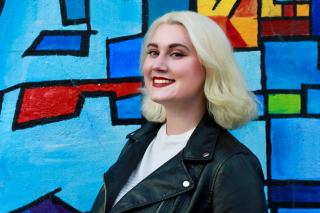Which was your first calling, writing or librarianship?
Being a writer was my first passion, but every author needs a day job! It was sort of a guessing game to see what I wanted that day job to be. I tried a few things and found that working in publishing wasn't for me. I got a job at the Public Library of Brookline and liked it so much that I wound up going to graduate school for library and information science. All of my co-workers were either students or alumni from Simmons, so it was a natural choice.
What inspired you to write your YA debut novel, My Dearest Darkest?

I originally created these characters when I was a teenager, but in a completely different story. Years later, I had the characters still kicking around in my mind and was looking for a new plot to put them into. While it's hard for me to claim to be a fan of Lovecraft, I found the concept of cosmic horror that he created very appealing. It's a different sort of horror from slashers or gothic stories. Cosmic horror is a more existential take on horror, focused on the fear of the unknown, the Other. It also has an emphasis on dangerous knowledge and the existence of entities outside of human comprehension. Unlike Lovecraft, modern takes on cosmic horror focus on what was traditionally considered the Other — such as minorities, or other people outside of societal boundaries — and tells stories of what is scary about being perceived as not belonging. In addition, literal monsters serve as a metaphorical view of that sort of vulnerability and fear of being the Other.
What was the most rewarding/challenging part of writing the book?
I had never written a Sapphic romance when I sat down to write this book. I had been out for two years at that point, and it had been too scary to write my personal experiences in my fiction. The idea of total strangers knowing a personal detail about my life was really daunting at first, but as soon as I sat down to write it, creating characters with life experiences similar to mine, it felt so much more natural than what I have written in the past. It's personal, but other people will be able to relate to it. Being able to share stories focused on people who are marginalized is vital for the people who share these experiences, and also for people who don't, because it builds empathy and understanding. This is what makes diverse literature such a boon.
As a librarian, I work with teens and tweens. I wear my Pride pin and I'm visibly out as bi, with she/they pronouns. It has made the kids more comfortable talking about themselves with me. There is a group of kids who come in every day, and they ask, "Can I have a she/they or they/them pin?" I want to make the library feel safe and accepting of them. My goal is to be the person that I never had as a teenager; to show them that no matter how you identify, you can have a life and be happy and successful and gainfully employed.
Any advice for writers?
I've found that both librarianship and writing are things that are hard to get into. It can be super demoralizing, and you can feel like you're just spinning your wheels and not getting anywhere. Start by making connections with people in your field. It's very important to have people to talk to and who understand your struggles. They will be great resources down the road. I have a group chat with my LIS friends, and they have been sending me screenshots to show that they bought my book for their libraries.
Follow Kayla on Twitter at @peculiaritea and on Instagram at @kcottcan.

